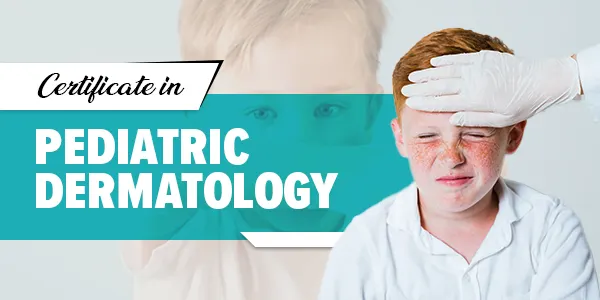
Pediatric dermatology is a specialised field of medicine that focuses on diagnosing and treating skin issues in children, from newborns to adolescents. These conditions require a tailored approach to the treatment, as the skin of children is different from that of adults. The skin of children is more delicate than that of an adult and often responds differently to treatment. Consequently, healthcare professionals require specialised training to deliver safe and effective care. A Certificate in Pediatric Dermatology provides healthcare professionals with specialised knowledge to address children's unique dermatological needs.
Skin disorders are one of the most common health concerns in children, as their skin is much more sensitive. The management of pediatric skin conditions requires a different approach altogether due to the psychological and developmental differences. Pediatric dermatologists treat conditions such as atopic dermatitis, diaper rash, birthmarks, and genetic skin disorders.Beyond medical treatment, the psychosocial impact cannot be overlooked. Skin conditions often influence a child’s self-esteem and social interactions. For families, the stress of managing chronic or visible conditions can also be overwhelming. A professional who has completed a structured certificate program is well-prepared to address not only the medical concerns but also the emotional aspects of care.
The Certificate Course in Pediatric Dermatology will help in managing common and rare skin conditions, identifying genetic or systemic diseases that manifest as skin symptoms, and providing comprehensive care through a multidisciplinary approach when necessary. A Certificate program provides clinicians with a recognised speciality that distinguishes them in their field, offers advanced expertise, and demonstrates a commitment to delivering the highest quality care for children with skin conditions.
The program is specifically designed for medical professionals to understand the physiology and psychology of children, as skin disorders significantly impact a child’s daily life, emotional health, and confidence. Moreover, children are unable to interpret their symptoms, so they rely on caregivers and doctors to understand their issues, which poses a challenge for a pediatric dermatologist and requires enhanced knowledge and skills to diagnose and treat them effectively.
The curriculum of the Pediatric Dermatology Certification includes topics such as:
Modern advancements have revolutionised pediatric dermatology, improving diagnostic precision and treatment outcomes. Notable developments include Dermatoscopy and imaging, which enhance the visualisation of skin structures for accurate diagnosis. Targeted Therapies, including biologics and other innovative medications for conditions such as severe eczema and psoriasis, and Teledermatology are remote consultations to increase access to care in underserved areas.
These advancements not only improve clinical care but also promote the integration of pediatric dermatology into multidisciplinary healthcare models.
A pediatric dermatologist is a specialist who combines expertise in dermatology and paediatrics to treat distinctive skin conditions. They play a vital role in:
The Pediatric Dermatology Online Course by MediCOLL Learning is a significant next step for medical professionals to advance in their careers. The course is a collaboration with the University of Liverpool, Royal College of Physicians, eIntegrity, Mangalayatan University, and is integrated with the NHS (UK), offering CPD-accredited certification. The certificate enhances the learning experience and provides a certification that is recognised internationally.
The highlights of the program:
Earning a Certificate in Pediatric Dermatology signifies an advanced skill and commitment to excellence in pediatric skin care. Graduates gain a competitive edge and become well-equipped to address the complex needs of young patients, their families, and modern healthcare systems.
After completing the certificate, participants can work as pediatric dermatology consultants in hospitals or private practices. Collaborate with multidisciplinary teams managing chronic skin conditions in children. Moreover, contribute to research and education in pediatric dermatology.
For healthcare providers, specialising in pediatric dermatology is more than just career advancement. It is an opportunity to make a lasting difference in children’s lives. By delivering precise treatment with empathy, clinicians can help children overcome challenges, regain confidence, and enjoy an improved quality of life.
Every child deserves not only medical attention but also compassionate care that considers their physical, emotional, and social development. A professional with expertise in pediatric dermatology is uniquely positioned to provide that level of support.
The Certificate Course in Pediatric Dermatology empowers medical professionals to advance their careers and deliver the best patient-centred care for children. The certificate program combines strong theoretical foundations with practical clinical experience, positioning graduates as leaders in pediatric dermatology.
By completing this certification, clinicians not only enhance their professional profile but also play a significant role in shaping the future of children’s health. Pediatric dermatology goes beyond treating skin; it is about restoring confidence, supporting families, and contributing to the overall well-being of the next generation.
Take the next step in your medical career by enrolling in the Certificate in Pediatric Dermatology and gain the skills to make a lasting difference in children’s health.
© Copyrights Medicoll All rights reserved.